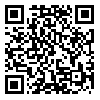Volume 14, Issue 3 (Occupational Medicine Quarterly Journal 2022)
tkj 2022, 14(3): 1-9 |
Back to browse issues page
Ethics code: IR.MUI.REC.1396.3.350دانشگاه
Download citation:
BibTeX | RIS | EndNote | Medlars | ProCite | Reference Manager | RefWorks
Send citation to:



BibTeX | RIS | EndNote | Medlars | ProCite | Reference Manager | RefWorks
Send citation to:
Ordudari Z, Habibi E. Investigation of correlation result of NORDIC questionnaire (wrist & hand) with DASH questionnaire. tkj 2022; 14 (3) :1-9
URL: http://tkj.ssu.ac.ir/article-1-1214-en.html
URL: http://tkj.ssu.ac.ir/article-1-1214-en.html
, zordudari@yahoo.com
Abstract: (1446 Views)
Background: Work-related musculoskeletal disorders occur predominantly in the upper limbs and cause disability. When is it comes to the perception of people as for their abilities, Questionnaires are useful and valuable tools. Questionnaires can be used to measure the symptoms of disease and disability. We decided to evaluate correlation result of NORDIC questionnaire (wrist & hand) with DASH questionnaire in the female assembly workers.
Methods: The study was a descriptive -analytic and cross-sectional one and was carried out among 82 female assembly workers. In order to evaluate the correlation result of NORDIC questionnaire (wrist & hand) with DASH questionnaire, by chi squire and spearman have been used. Data analysis was carried out by using SPSS 20. It is noteworthy to mention that P value <0.05 was considered significant.
Results: In this study, the results of the DASH questionnaire with the studied variables were similar to the results of the NORDIC questionnaire (wrist & hand). Moreover, in the majority of questions, there was a significant relationship between the two questionnaires (P value <0.05). The average score of DASH was obtained 19.65 ± 14.85 and 65.9% of the people had a mild upper limb. Moreover, 76.8% of the participants had distress in the wrists area, among which, 46.3% had a mild discomfort.
Conclusion: According to the results the DASH questionnaire is a useful tool for industrial and occupational issues. Therefore, due to the high relationship between two questionnaires, the DASH questionnaire could be used instead of the Nordic Questionnaire (Wrist and Hand).
Methods: The study was a descriptive -analytic and cross-sectional one and was carried out among 82 female assembly workers. In order to evaluate the correlation result of NORDIC questionnaire (wrist & hand) with DASH questionnaire, by chi squire and spearman have been used. Data analysis was carried out by using SPSS 20. It is noteworthy to mention that P value <0.05 was considered significant.
Results: In this study, the results of the DASH questionnaire with the studied variables were similar to the results of the NORDIC questionnaire (wrist & hand). Moreover, in the majority of questions, there was a significant relationship between the two questionnaires (P value <0.05). The average score of DASH was obtained 19.65 ± 14.85 and 65.9% of the people had a mild upper limb. Moreover, 76.8% of the participants had distress in the wrists area, among which, 46.3% had a mild discomfort.
Conclusion: According to the results the DASH questionnaire is a useful tool for industrial and occupational issues. Therefore, due to the high relationship between two questionnaires, the DASH questionnaire could be used instead of the Nordic Questionnaire (Wrist and Hand).
Type of Study: Research |
Subject:
Ergonomics
Received: 2022/11/8 | Accepted: 2022/11/12 | Published: 2022/12/6
Received: 2022/11/8 | Accepted: 2022/11/12 | Published: 2022/12/6
Send email to the article author
| Rights and permissions | |
 |
This work is licensed under a Creative Commons Attribution-NonCommercial 4.0 International License. |







